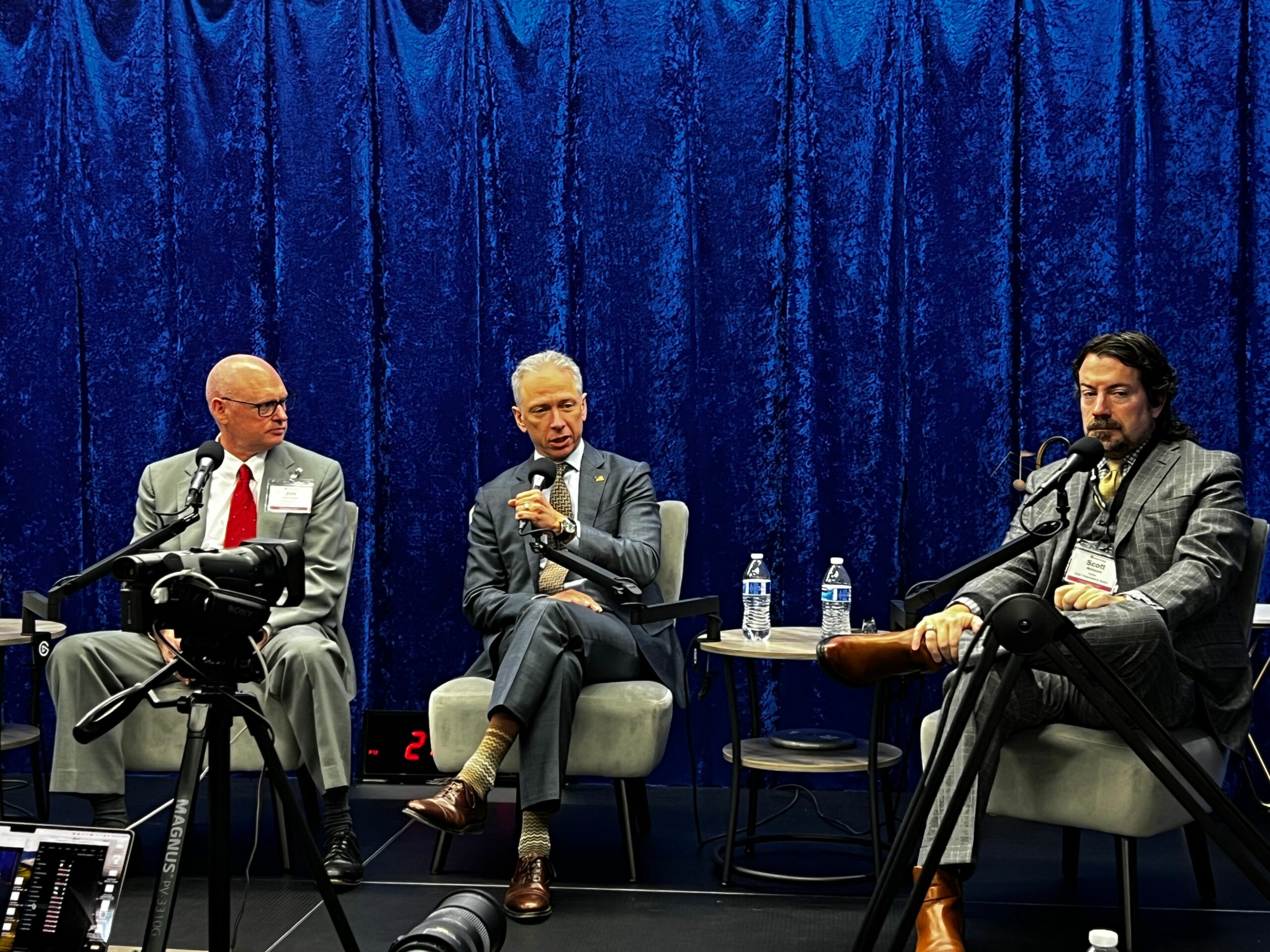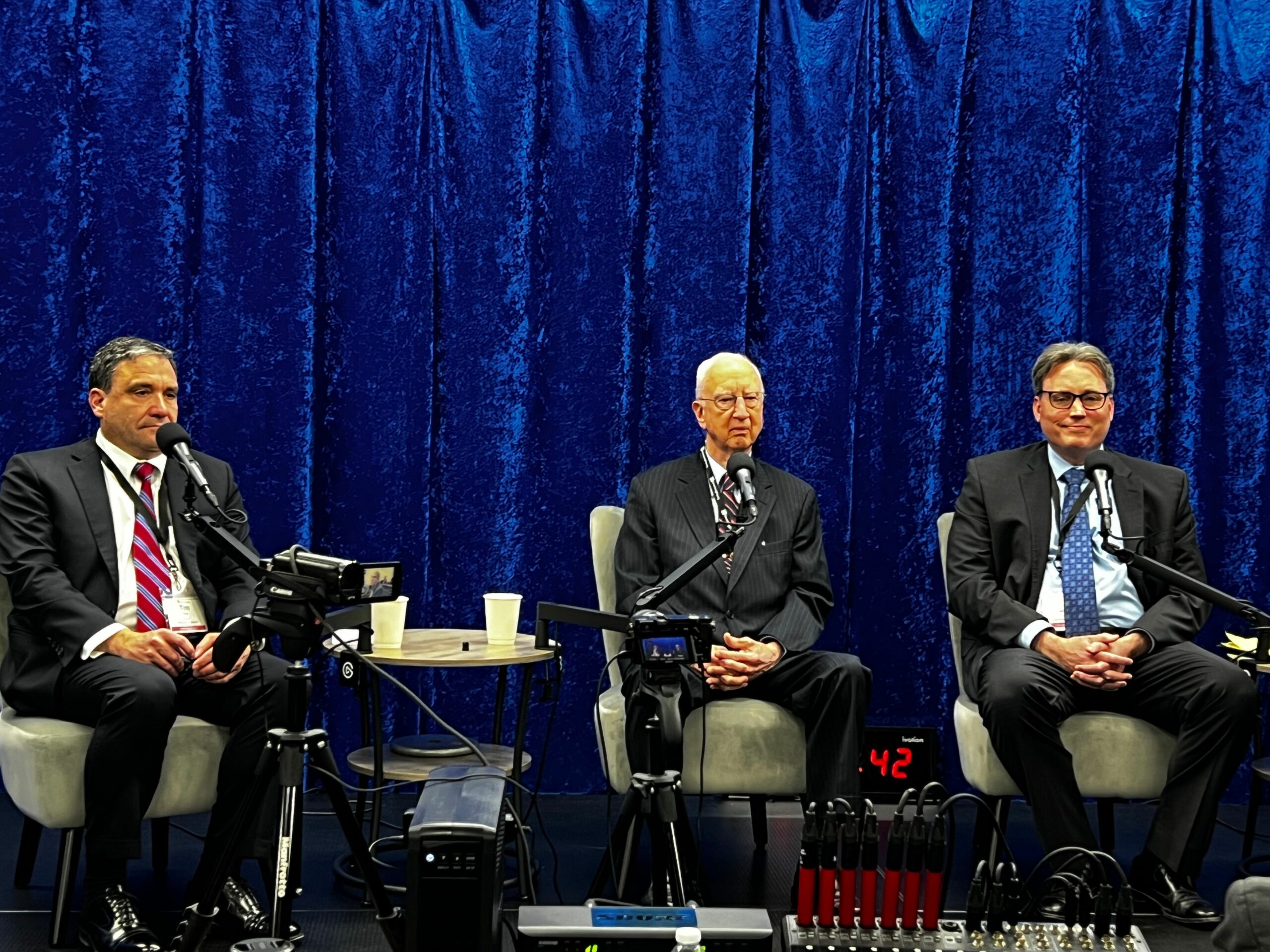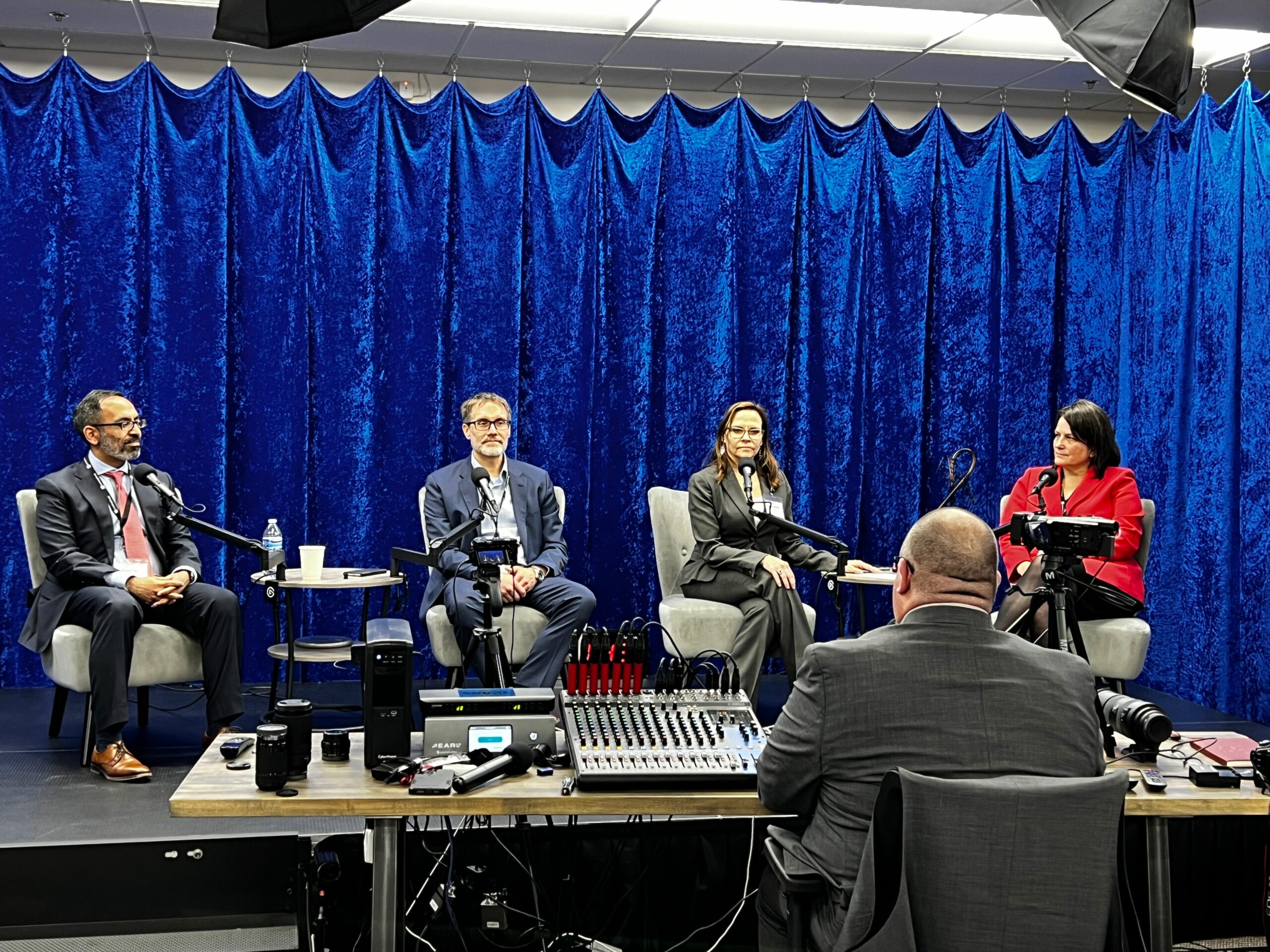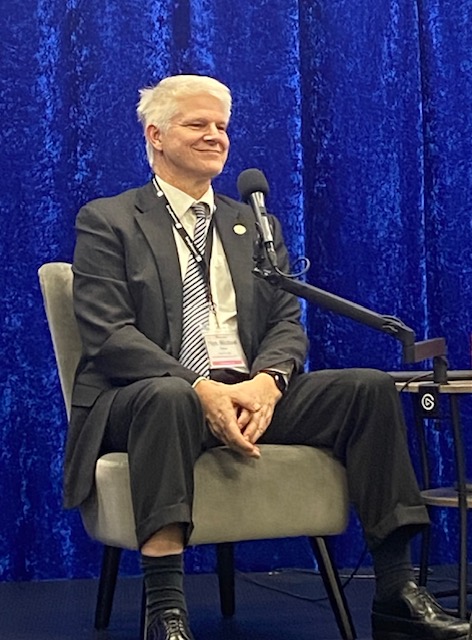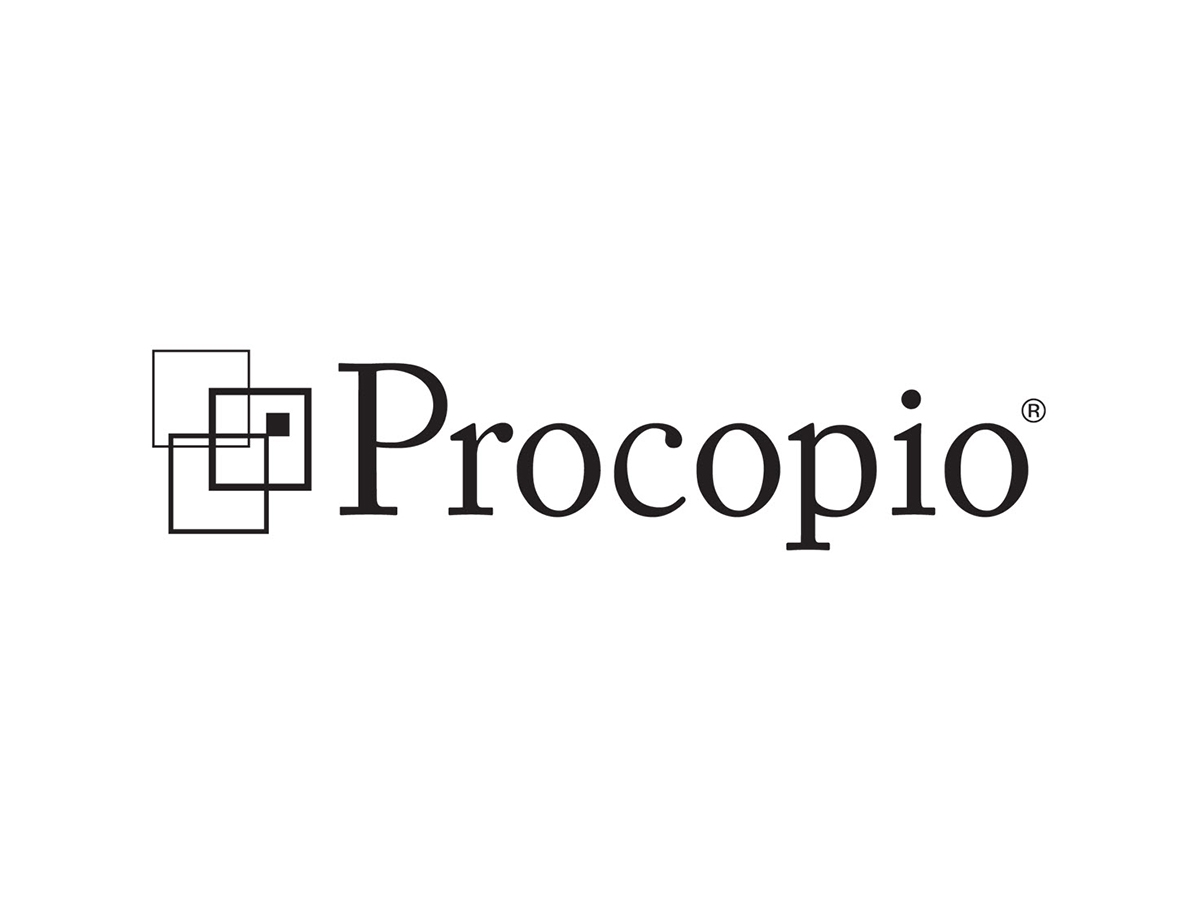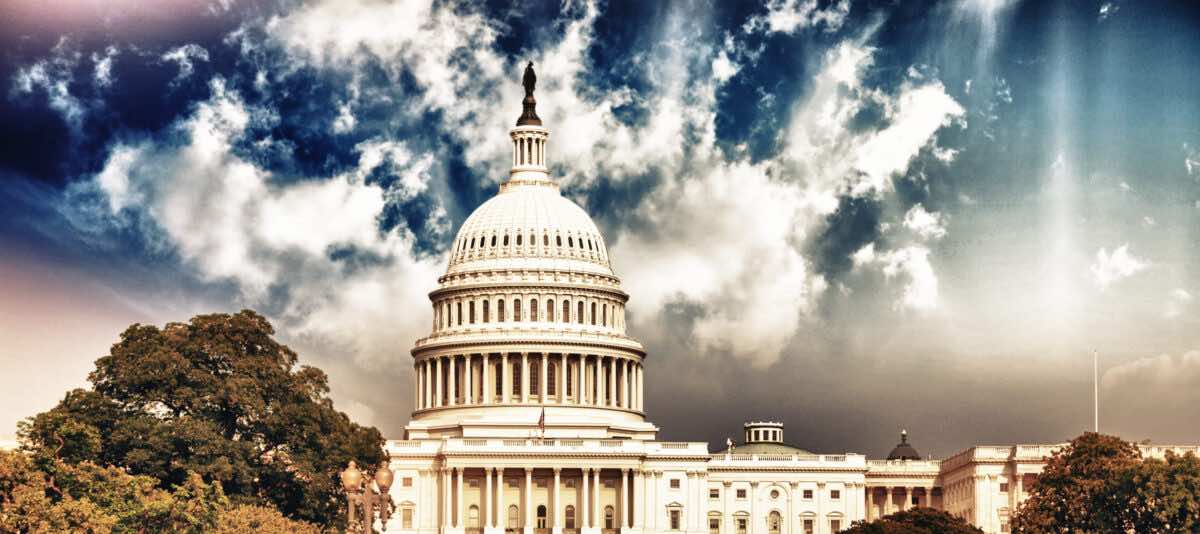Iancu, Michel and Other PTAB Masters Panelists Float Ways to Make the System Better
“In a fairly-functioning, balanced patent system…you do it once, do it right, and don’t do it again.” – Andrei Iancu
From left: Jim Carmichael, Andrei Iancu and Scott McKeown
Speakers at IPWatchdog’s PTAB Masters 2024 program this week predicted there will be little movement on the U.S. Patent and Trademark Office’s (USPTO) Advance Notice of Proposed Rulemaking anytime soon, but some pinned their hopes for change at the Patent Trial and Appeal Board (PTAB) to the pending Promoting and Respecting Economically Vital American Innovation Leadership (PREVAIL) Act.
Both panelists who typically represent petitioners and those who represent patent owners at the PTAB also agreed there are a number of ways the perception of the Board could be improved. These could include changes like allowing oral argument more often, allowing experts to testify in person, and a more meaningful rehearing procedure, for example. There was more disagreement, however, around proposals like changing the standard for patent invalidity at the PTAB to “clear and convincing” rather than “preponderance of” the evidence, and requiring that claims be interpreted using the “plain and ordinary meaning” standard used in district courts—both proposals that are in the current version of the PREVAIL Act.
Problems and Solutions
Former USPTO Director and Sullivan & Cromwell Partner, Andrei Iancu (pictured above), speaking on the first panel of the program, said the system has become too unbalanced against patent owners. Between the practice of filing serial inter partes review (IPR) petitions by the same petitioners against the same patents; parallel IPRs; multiple attacks in the district courts and at the PTAB; and the option to file a reexamination after losing an IPR, there is never quiet title for patent owners anymore, Iancu said. “In a fairly-functioning, balanced patent system…you do it once, do it right and don’t do it again,” he explained. “If a mistake is made, that’s what the appellate process is for. Not these other parallel, serial, multiple challenges in different venues.”
Jim Carmichael (pictured above) of Carmichael IP—a Diamond sponsor and co-chair of the PTAB Masters program—agreed with Iancu that there are simply too many chances to attack patents in the current system. There’s not only a second window, but a third and fourth and fifth and sixth window to challenge a particular patent, Carmichael said, adding: “Our patent owner clients would like to have their rights settled at some point.”
The PREVAIL Act would also tackle these issues, with proposals that would require standing for PTAB challengers; limit multiple petitions against the same patent by “prohibiting any entity financially contributing to a PTAB challenge from bringing its own challenge”; apply estoppel at the time the challenge is filed rather than after the Final Written Decision; and that would end the practice of filing reexaminations following failed PTAB petitions.
While the USPTO’s April 2023 ANPRM also addressed many of the issues raised by panelists during the program, sources have told IPWatchdog the latest iteration of the proposed rules package—the Notice of Proposed Rulemaking, or NPRM, which will contain the official USPTO proposals—is currently sitting at the Office of Management and Budget (OMB) and is unlikely to move forward anytime soon as it is an election year. Furthermore, many commented that the USPTO’s proposals are likely to focus more on codifying existing USPTO precedent, such as discretionary denial practice, than on introducing any new or controversial rules.
PREVAIL and Other Prospects
From left: Tim Fink, Judge Paul Michel and Stephen McBride (Carmichael IP)
Judge Paul Michel (pictured left), who participated on a panel that reviewed pending PTAB legislation and rules on Monday, said the PREVAIL Act has a real chance because it has bipartisan support, including from the second-highest ranking Senator for the Democratic Caucus, Dick Durbin (D-IL), and because stakeholders on both sides of the issues agree there are changes that need to be made at the PTAB. For instance, Scott McKeown (pictured above) of Wolf Greenfield–also a Diamond Sponsor and co-chair of this week’s program, who represents mostly PTAB petitioners, said that allowing oral hearing more easily might help the reputation of the PTAB. The practice of requiring both parties to agree to oral hearing results in a perception that the petitioner can prevent the patent owner from being in the same room as the judges, McKeown said. “I don’t think that changes the outcome [often], but the perception is the problem,” McKeown added, explaining that such a policy simply plays into the hands of those who say the PTAB is anti-patent.
In a later panel, however, McKeown disagreed that the PREVAIL Act has a good chance of passing. “I’m not very optimistic,” McKeown commented, adding that it certainly won’t move this year and most likely not next year either. “I don’t think it’s reasonable because it’s trying to do way too much,” he added.
Let’s See the Experts
Other panelists throughout the program said experts should be testifying in front of PTAB judges more regularly, rather than just on paper. Michel said experts are often key to decision-making, citing his experience in arbitration. “Congress wanted a documentary proceeding, but what evolved is a litigation-type process with experts on both sides, and adjudicators never see them,” Michel commented. “In every arbitration case, the lightbulb went off for the arbitrators in the final round, when the experts came to the stand. That’s when it became really clear.”
Tim Fink (pictured above) of program sponsor O’Melveny & Myers, a former Vice Chief PTAB judge who was speaking on the same panel as Michel, said he thinks a lot of PTAB judges would be ok with live expert testimony but that it would have to be affordable for the PTAB and the parties.
We Need a Better PTAB Rehearing Process
From left: Raghav Bajaj (Haynes Boone); Heath Briggs (Greenberg Traurig); Meredith Addy and Lori Gordon
Another idea that seemed to garner support from both petitioner and patent owner representatives was the prospect of a rehearing process at the PTAB that actually works. Presently, parties can request rehearing, but they rarely do. According to a 2019 analysis of rehearing statistics by Foley & Lardner, more than 90% of requests for rehearing were denied.
Lori Gordon (pictured right) of Perkins Coie, who represents petitioners, said a more meaningful review process might help with the backlog of PTAB cases at the U.S. Court of Appeals for the Federal Circuit (CAFC). “Perhaps if there was a more meaningful request for rehearing process at the PTAB there would be fewer appeals to the CAFC,” Gordon said. “The success rate in rehearing is extremely low and [the Director Review process] is so narrow. If there was a meaningful process at the Board maybe that would cut down on the cases parties feel they need to appeal.”
What the CAFC Can Do
Meredith Addy (pictured above right) of AddyHart P.C. said the CAFC’s approach to reviewing PTAB cases has become a major problem for patent owners. With so many appeals from the PTAB to deal with, the CAFC has decided primarily to review cases for substantial evidence, rather than addressing legal questions. “I don’t think that’s what the CAFC is for,” Addy said. “They’re there to decide doctrines…. What if the substantial evidence the PTAB relied on was wrong?”
To illustrate her point, Addy pointed to Judge Pauline Newman’s dissent in the March 2023 precedential case of Roku v. Universal Electronics, where Newman disagreed with her colleagues’ decision to decline review of the legal questions of claim construction and obviousness de novo, and instead to review only the Board’s fact-finding. While the dissent was atypical for Newman in the sense that she was disagreeing with a decision that upheld a patent, it demonstrated her commitment to reviewing questions of law. Newman said in her dissent:
“I do not ‘assert[] that we should apply de novo review to [the factual] issue. I do assert that we should apply de novo review to the issue on appeal, that is, the legal issue of obviousness. ‘It is emphatically the province and duty of the judicial department to say what the law is. Those who apply the rule to particular cases, must of necessity expound and interpret that rule.’ Marbury v. Madison, 5 U.S. 137, 177 (1803). This foundation of appellate review applies whether or not any facts are disputed.”
Judge Michel said the CAFC can also help by clarifying issues like claim construction and written description. “[Claim construction law] is a mess,” Michel said. “That’s [the CAFC’s] fault. They have numerous inconsistent decisions on claim construction. They need to go en banc and clarify that.”
Michel also said examiners too often issue broad claims because they aren’t applying Section 112 correctly, which results in easily invalidated patents, and that the CAFC can do more to curb that. “The applicant should get what they’re entitled to and not what they’re not entitled to,” Michel said.
Be Ethical—and Reasonable
Judge Michael Tierney
Other panels throughout the program tackled the ways that litigation finance factors into PTAB strategies, off-the-record discussions featuring stakeholder and judges’ perspectives on PTAB practice, ethics issues at the PTAB, and more.
During the ethics session on day two, PTAB Vice Chief Judge Michael Tierney said parties need to be especially careful about making inconsistent statements between the PTAB and district courts and also should avoid pushing too hard to penalize their opponents when they make very minor mistakes. While the practitioners on the panel expressed frustration about the other side sometimes not following the rules, such as missing deadlines, Tierney said the Board notices repeat infractions and that “they do have a cumulative effect,” but to be wary of being petty.
“I don’t mind someone pointing out a minor infraction, but don’t ask for fire and brimstone,” Tierney said. “If there’s something egregious, bring it to our attention and ask for sanctions,” he added, but urged attendees to be able to explicitly explain what the prejudice is if they’re pushing back on something minor.
Check out IPWatchdog’s calendar to join us for our next live program.

